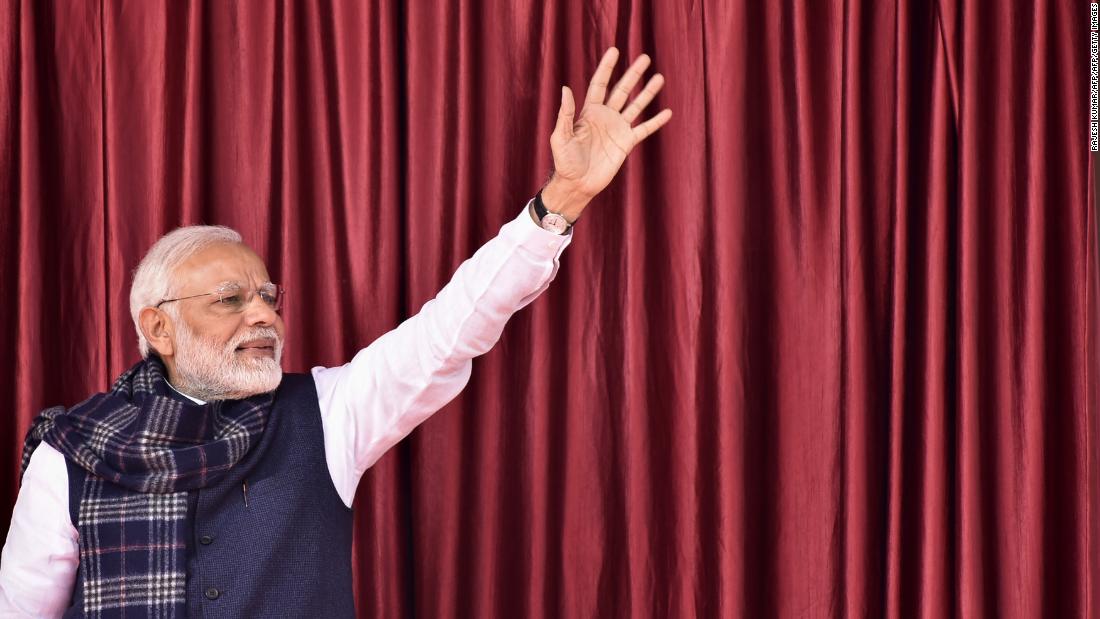
The BJP-backed bill, introduced Tuesday, would amend the country's constitution to add "economically weaker citizens" to the sections of society eligible for job quotas.
Under the country's system of affirmative action, the Indian government reserves 50% of jobs in government and places at educational institutions for people from lower castes, or classified as "socially and educationally backward people."
The new amendment, if approved, would reserve another 10% of jobs for poorer people of higher castes. The bill passed the lower house of Parliament Tuesday but must still be approved by the upper house.
"We are resolutely committed to the principle of 'Sabka Saath, Sabka Vikas,'" tweeted Prime Minister Narendra Modi, referring to a BJP slogan which loosely translates to "unity together, development together."
"It is our endeavour to ensure that every poor person, irrespective of caste or creed gets to lead a life of dignity, and gets access to all possible opportunities," Modi added.
In 2014, Modi campaigned on the promise of millions of new jobs -- a promise critics say that he has failed to fulfil. This move is being seen as an attempt to repackage his image a few months before India's general elections due to be held during April and May.
Shekhar Gupta, one of India's most prominent political commentators, called the move a "cynical and desperate ploy" that shows that the "BJP leadership is more nervous about the elections than we would've thought."
Members of the main opposition Congress party were quick to point out that the bill does not actually create new jobs.
"Without jobs, creating reservation in jobs may just prove to be one more jumla (false promise), for the purposes of election promises," a Congress spokesperson told local reporters.
An editorial in The Hindu, a leading Indian newspaper, criticized the BJP for using a system meant to right historical wrongs as a political tool.
"Reservations have been traditionally provided to undo historical injustice and social exclusion suffered over a period of time, and the question is whether they should be extended to those with social and educational capital solely on the basis of what they earn."
History of India's reservation system
After India's independence from British colonial rule in 1947, the constitution specifically created provisions for socially and educationally backward classes in the society.
Indian society has been bogged down by casteism for generations, where certain sections of the society, also known as Dalits or untouchables have suffered from low-grade work, discrimination and poor educational opportunities.
For centuries, people belonging to lower castes were not accepted by the rest of the Indian society. This consistent discrimination resulted in a tilted population -- which still exists -- where educational and job opportunities are out of reach for a percentage of the population.
The provision in the constitution enabled the government to offer affirmative action for government jobs and educational institutions -- an attempt to correct a historical wrong.
However, decades of electoral politics have resulted in a skewed view of the original intention. To limit the blatant misuse of announcing reservations for the purposes of expanding one's vote bank, the Supreme Court stepped in.
In a 1992 judgment the court capped all reservations at 50 percent.
"Social status and economic power are so woven and fused into the caste system in Indian rural society that one may without hesitation, say that if poverty be the cause, caste is the primary index of social backwardness, so that social backwardness is often readily identifiable with reference to a person's caste," the judgment said.
Since the decision, reservations have always played an important role in Indian elections as politicians promise affirmative action to different castes and cultures in an attempt to woo voters.
'Un-equals cannot be treated equally'
In a statement in Parliament Tuesday, Finance Minister Arun Jaitley voiced his support for the bill, insisting that the cap by the Supreme Court was on only caste-based reservation and reserving more jobs for the poor upper-caste members would help boost the economy.
"Just as equals cannot be treated unequally, un-equals cannot be treated equally," said Jaitley.
But the BJP's announcement has been received with a healthy dose of skepticism by the opposition, who are unwilling to openly support the ruling party but at the same time cannot oppose the reservations due to the political ramifications.
The Congress party came out swiftly in support for the reservations but insisted that reservations in jobs has no meaning if the government has not created enough jobs.
"Congress party has always supported every step for reservation and extending support to the economically poor sections of the society, bereft of caste, community or creed without interfering with the constitutional mandate of reservation given to Dalits (lower caste), to Adivasis (tribal) and to backward classes in any manner," said a Congress spokesperson.
Bagikan Berita Ini















0 Response to "India's ruling party pushes for upper caste job quotas ahead of election"
Post a Comment